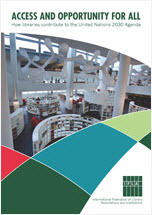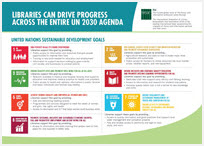Libraries make an essential contribution to development
28 June 2016
New IFLA publications to support your work on the UN 2030 Agenda
 Act now to make sure libraries are included in your country’s national development plans for the SDGs!!
Act now to make sure libraries are included in your country’s national development plans for the SDGs!!
The inclusion of libraries and access to information in national and regional development plans will contribute to meeting the global United Nations 2030 Agenda for Sustainable Development.
In support of this goal, IFLA has today published a booklet of examples and recommendations for policymakers demonstrating the contribution of libraries to the UN Sustainable Development Goals (SDGs). There is also a supporting 2-page handout.
The booklet includes stories from all types of libraries in from many countries around the world. IFLA thanks all IFLA members and partners that contributed their stories for the booklet. Additional stories will be made available online, and you can re-print the booklet and handout at any time. Print copies will also be mailed to all IFLA members and additional copies can be ordered from IFLA Headquarters.
You can use the booklet in a variety of ways: to assist your organisation in advocacy planning and in identifying compelling stories from your own country, or give it to your policymakers when you hold meetings to show the contribution libraries make to your national development.
These publications and other UN 2030 Agenda support materials will be made available in all seven official IFLA languages on the Libraries and Development part of the IFLA website.
UN 2030 Agenda – Take the Next Step
We must now show that libraries can drive progress across the entire 2030 Agenda. While the SDGs are universal goals, each country will be responsible for developing and implementing national strategies to achieve them, and will be expected to track and report its own progress toward each goal. Advocacy is essential to secure recognition for the role of libraries as engines of local development, and to ensure that libraries receive the resources needed to continue this work.
The process will be different in each country, and many have already decided how the SDGs will be implemented nationally.
We encourage all library associations and institutions to take action now so that libraries are included in national and regional plans.
The library community in every country must take this important opportunity. If libraries and librarians are to be successful partners in achieving the SDGs they will need the support of strong associations and institutions to support advocacy, to assess the needs of the local library community and to assist librarians to respond.
Background
In September 2015, the United Nations endorsed the 2030 Agenda for Sustainable Development. IFLA has been actively involved in the process of creating the Sustainable Development Goals (SDGs) over the last years and has advocated for the importance of access to information, Information and Communication Technologies (ICTs), culture and universal literacy, all of which have been included in the UN 2030 Agenda.
IFLA has produced a toolkit with customisable templates and a booklet to support you in your advocacy work. They can be used together, or separately:
- Use the toolkit for background on the UN 2030 Agenda and to plan your advocacy;
- Use the booklet and handout as documents you can take to meetings to give to government officials or coalition partners;
- Send electronic versions of the booklet and handout to your members, your partners, and decision makers;
- Re-print the booklet and handout for additional meetings.
More information and files for re-printing all documents can be found on the publication webpage.